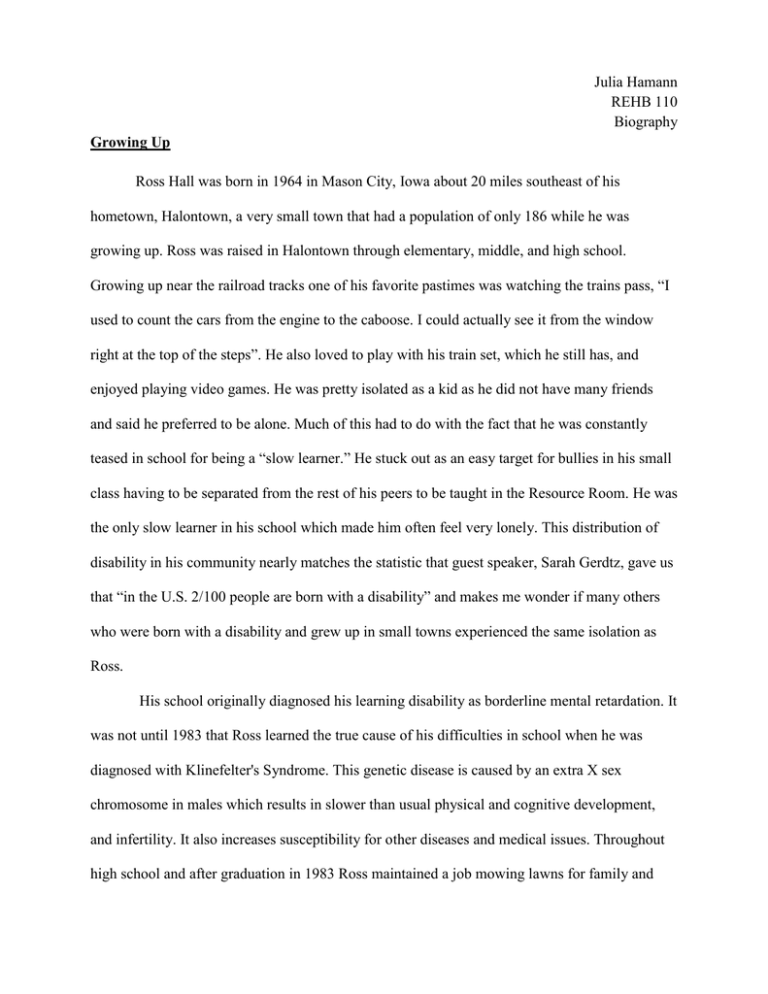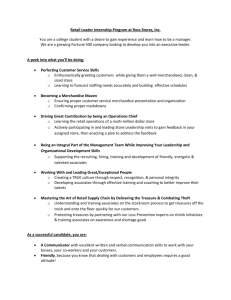Biography
advertisement

Julia Hamann REHB 110 Biography Growing Up Ross Hall was born in 1964 in Mason City, Iowa about 20 miles southeast of his hometown, Halontown, a very small town that had a population of only 186 while he was growing up. Ross was raised in Halontown through elementary, middle, and high school. Growing up near the railroad tracks one of his favorite pastimes was watching the trains pass, “I used to count the cars from the engine to the caboose. I could actually see it from the window right at the top of the steps”. He also loved to play with his train set, which he still has, and enjoyed playing video games. He was pretty isolated as a kid as he did not have many friends and said he preferred to be alone. Much of this had to do with the fact that he was constantly teased in school for being a “slow learner.” He stuck out as an easy target for bullies in his small class having to be separated from the rest of his peers to be taught in the Resource Room. He was the only slow learner in his school which made him often feel very lonely. This distribution of disability in his community nearly matches the statistic that guest speaker, Sarah Gerdtz, gave us that “in the U.S. 2/100 people are born with a disability” and makes me wonder if many others who were born with a disability and grew up in small towns experienced the same isolation as Ross. His school originally diagnosed his learning disability as borderline mental retardation. It was not until 1983 that Ross learned the true cause of his difficulties in school when he was diagnosed with Klinefelter's Syndrome. This genetic disease is caused by an extra X sex chromosome in males which results in slower than usual physical and cognitive development, and infertility. It also increases susceptibility for other diseases and medical issues. Throughout high school and after graduation in 1983 Ross maintained a job mowing lawns for family and friends as well as several parks and an apartment complex in his hometown and surrounding area. Starting an Independent Life Ross left Halontown in the beginning of 1990 at the age of 25 when his parents retired to Arizona. He decided to settle in Minnesota on Jefferson Lake where his family had a lake cabin. Once settled into Minnesota he started working at the Pillsbury Green Giant plant running a fork lift. Nearly two years later Ross moved to Le Sueur and started working for the Le Sueur Cheese Company. While working with the Cheese Company he fell into his first severe depression. When his boss noticed that Ross was not acting like his usual self and confronted him about it Ross confided that he “felt like [he] was in a black hole.” Ross was sent to a psychiatrist who diagnosed him with bipolar disorder in at the age of 28, only the second of many more medical issues to come. Ross met his ex-wife Dahleen in Le Sueur and moved to an apartment in North Mankato with her shortly after they were married in 1992. Ross continued to work at the Cheese Company until he and his wife were divorced three years later due to his mental illness. Ross had to move back to the lake cabin while looking for a new place to live and work. He eventually moved back to Mankato into the Walnut Towers apartments when he found a job working for the Salvation Army in 1996. He worked there until 1998 when he found a better job working for the Taylor Corporation. All of the stress from the divorce, the move, and the multiple job changes was really hard on Ross because he felt as though “his life was spinning out of control.” This made his bipolar disorder very hard to handle which made sense as “the experience of helplessness, when control or power are desperately needed or wanted, has been shown to be one of the most destructive mood states known to humankind,” (Vash & Crewe, pg.73). His mood so deteriorated that he had to leave his job with Taylor Corp. within the year. Working with Disability Ross was able to obtain Social Security disability payments due to his bipolar disorder. This was hard for him at first because like John Callahan who writes about the culturally instilled “prevailing negative attitude” toward government assistance, the stigma of receiving social security payments made him feel worthless. Vash & Crewe discuss the ubiquity of this feeling amongst those receiving financial assistance, “although one can survive on a welfare income, the lifestyle it affords is marginal and stigmatized,” (pg.111). In the long run he learned to appreciate the help as it allowed him to take some time to relax and get back to a more stable mental state. Once he was feeling better in 1999 he was able to get a job working with MRCI, a company that helps people with disabilities in Southern Minnesota find jobs well suited for them. This job really helped with his mental state as he felt it gave him a sense of purpose; this aligns well with Vash & Crewe’s discussion of the incentives for people with disabilities to work including “inner rewards associated with self-esteem, belongingness, and self-actualization,” (pg.111). Although he did not like the stigma of government assistance he also appreciated that the job with MRCI allowed him to continue to receive disability payments relieving the stress of making ends meet. Ross was really proud of the work he did and liked to brag about how well he did his job making boxes for Tony Downs chicken cans claiming to be “the fastest worker they had”. It was evident how important it was for him to feel like he made a difference to society and that it really helped him maintain a positive attitude about life. A Major Loss The same year that he started working with MRCI he was also diagnosed with diabetes. All was well with Ross until he began to have complications caused by the diabetes starting in 2007. Poor circulation caused the need for one of his toes to be removed. In 2008 he had to have another toe removed because the first toe he had removed did not heal properly. In 2010 he got an infection in another toe which also had to be removed. This was hard on Ross as he was forced to leave his job to recover from the toe surgeries. He had to have three more toes removed in 2012. A week later he incurred a severe life threatening fungal infection on his right foot where the toes had been removed. The only way to save Ross’s life would be a below the knee amputation. Ross took this really hard. When describing his reaction to the news he confided, “I cried my head off.” He felt as though losing his leg was equivalent to losing his independence. Rehabilitation and Recovery from Amputaion Ross had his amputation surgery at the Immanuel St. Joseph’s Hospital in Mankato on July 22nd, 2012. The procedure went well without any complications and Ross was able to leave the hospital five days after his surgery to start his rehabilitation process. He stayed at Oaklawn Health Care Center during his recovery where he received recreational, physical and occupational therapy. Ross was really scared to go through the therapy process, but overcame those fears with encouragement from his younger sister, Martha. He did have some difficulties at first getting proper care for his diabetes. The hospital had failed to include his diabetes diagnosis in the medical chart they had given the rehabilitation facility. At first the health care attendants did not believe Ross when he told them he was diabetic, but they eventually had him tested because he wasn’t afraid to assert himself to get the proper care he deserved. The test came back positive and they immediately began checking his blood sugar and giving him medication. This was a perfect example of Vash & Crewe’s discussion of the need for assertiveness to receive equal rights and proper care, “The need for assertiveness, leavened with irreproachable diplomacy, is nowhere more evident than in dealing with people whose positions of authority allow them to determine the directions and qualities of others’ lives” (pg.55). If Ross had not been assertive in a polite manner about his need for treatment of his diabetes to those in charge of his care at Oaklawn his quality of life could have been severely hindered as his health would not have been adequately cared for and being rude may have caused his caregivers to treat him with less respect. Other than the diabetes issue Ross was really pleased with his care and training at Oaklawn. Recreational therapy got him even more into doing crafts than he already was, and provided him with a chance to exercise his musical side by joining the bell choir. Through the physical therapy exercises he grew strong enough to walk again with his extremely heavy prosthetic leg and the assistance of a walker. They even taught him how to properly use a cane, but he little hope on being able to walk with a cane since he is very tall and he has had trouble finding a long enough cane. Assisted Living Once Ross was finished with his physical, recreational, and occupational therapy programs he began the search for an assisted living home. At first he was having trouble finding places with proper accommodations, but he eventually found a place he really loves in Cedar Haven Assisted Living Home. When asked if he had experienced or witnessed any abuses similar to “fight club” discussed by Nancy Fitzsimons, the stories told in the video Lest We Forget, those narrated in Regina’s Record, or the experiences shared by Carey Verner and Mike Sag while residing in assisted living homes he thankfully replied that he has been spared such terrible treatment that so many others in similar living situations are still vulnerable to today. Ross feels safe and respected at Cedar Haven and appreciates having the privacy of his own room which he can lock if he needs to, while at the same time having the nurses there to help him keep track of the multitude of medications he needs to take, help him maintain a healthy diet, and simply to be around in case he might ever have any kind of accident such as a fall. Ross also really enjoys Cedar Haven because it is right on the bus line and very near to his psychiatrist, and the prosthetic and orthopedic clinic; even though Ross’s wound is healed and he is able to walk, the medical process of his amputation is still not over. The muscle and skin at the stump of his leg continues to shrink so he must be periodically refitted for a new prosthetic casting. He has just recently been fitted for his third one. A Typical Day Ross spends most of his time at Cedar Haven. A typical day starts out with an early morning wake-up call from the nurses for breakfast, his morning pills, and a check of his blood sugar. The residents are then free to do whatever they want until lunch at 11:30am. Ross is not much of a morning person so he usually goes back to sleep for a while and then watches some television. About a half an hour before lunch Ross has to have his blood sugar checked again and take his midday medications. After lunch he has a good portion of his afternoon open until just before supper time when he has his third blood sugar check, and medication distribution. Again he has time available to him until his fourth and final blood sugar check later in the evening before he goes to bed. Throughout the course of the day Ross takes 10 different medications, two for his mental illness, one for pain, two for blood pressure, one for allergies, two for diabetes, one to help control a snorting tick, one for Cronic Obstructive Pulmonary Disease, and he also receives testosterone shots every three weeks for the Kleinfelter’s Syndrome. Although Ross is sometimes exhausted by his strict medical regimen, he sincerely appreciates what his medical care providers and continuous medical innovation has been able to do for him; “medical science has made remarkable advances in the treatment of illness and disability,” (Vash & Crewe, pg. 285). Without such services he would not be able to maintain the quality of life that he does and perhaps would not even be alive. Recreation as Therapy Ross has many hobbies he likes to engage in to keep himself busy. He loves to play video games. His favorite video games are Wheel of Fortune and Legend of Zelda. He enjoys doing picture puzzles as well as the number logic puzzle sudoku. He especially likes sudoku because despite his difficulties in school he has always been good with numbers. Another numbers game he is involved in is the stock exchange; his father taught him about stocks in high school and he has loved it ever since. Ross also really enjoys doing crafts. His mom has taught him to knit, and he has made up several scarves for himself and as gifts for people in his family. He is extremely into weaving coasters with loops on his loom. Ross is very proud of all the coasters he has made. He has made over 800 and has given most of them away. He keeps track of every one he gives away and to whom in a notebook he keeps with his supplies. He even gave me one for my sister, my mom, my dad, and I making them especially for us with the colors I selected. Through his stories it became evident that Ross is very generous and thoroughly enjoys giving gifts. With the coasters it is a win-win situation because he considers crafting a form of therapy for him where he can channel negative energy and he gets the joy of gift giving. In fact he considers all of his hobbies a form of therapy that help him focus on staying positive and enjoying life. Vash & Crewe also promote the benefits of recreational activity advocating “their therapeutic value,” (pg.138). Another major source of therapy for Ross that also gets him out of his room is going to Church. Because he would miss lunch he cannot go to the mass he would prefer to go to that has a contemporary Christian band perform every Sunday, but he does not let this discourage him. Instead he wakes up to go to the early mass every Sunday. Since it is something that is so important to him this is the activity we decided to do together. It was nice to see how welcoming everyone was to Ross and the accommodating “handicapped” seating they had so he could easily store his walker. Everyone greeted us with a smile and there was no awkward gawking. Throughout the interview process it became clear that Ross’s faith in God has really helped him cope with the myriad of medical and social issues he has been challenged with throughout his life by allowing him to shape his perspective on the meaning of his disabilities in a positive light. “Ones spiritual belief system and philosophy of life shape the meaning of disablement for each affected person; this, in turn, influences the ways in which one reacts,” (Vash & Crewe, pg. 21). Aside from church Ross really enjoys getting out of Cedar Haven as much as possible. He is a member of a free organization, Second Step Club, which is provides a club house for people with disabilities to socialize and use resources such as computers provided for them. Second Step also organizes some outings such as going to Twins and Timberwolves games and the Ten County Camp which Ross has attended the past few years. At the camp he loves to go on the pontoon ride, sitting by the fire, doing tie dye and other crafts, and socializing with the friends he meets there. He also lives within walking distance of the Mankato Moondogs Stadium and he tries to get there as often as he can afford during the season. Ross would like to do more things outside of Cedar Haven, but unfortunately they are too expensive. Social Security does pay for his medical care and resident fees for Cedar Haven, but that only leaves him an extra $96 a month to pay for any other expenses he may have. If it were not for the limitation of expense he would love to be involved in LEEP (Leisure Education for Exceptional People) which takes people with disabilities on educational outings and sets up social activities for them. He would also really like to visit Florida or California to go to Disney World or Disney Land if he had the funds. He does not feel comfortable asking his family for financial help because they already help him so much as it is. His mom pays for all his assistive devices and his sister pays for him to fly to Illinois to visit every Christmas. A Wonderful Support System Like our guest speaker, Tara, who could not have shown more gratitude for her family’s part in her “wonderful support system” that helped her cope with her disability Ross is also incredibly grateful for all that his family does for him. If it were not for their support it would be much harder for him to cope with the challenges that come with his disabilities. Ross only has one sibling, his younger sister Martha, who has been there for him through it all. She proved very helpful in satiating his fears of going through physical therapy. In addition to the encouragement mentioned earlier she also took videos and photos of Ross’s progress throughout his rehabilitation from his amputation and sent them out to the rest of his family and relayed their support back to Ross. His sister has also played a large role in helping him cope with the fact that he cannot have children by making him the godfather of his niece. He made it clear that he is very proud of this role as he told me about crying when his sister first asked him and he liked to brag about his niece’s success in high school and marching band. He is also very proud of his nephew who is currently completing his sophomore year at Iowa State University studying medical engineering, a course of study inspired by his uncle’s medical experiences. Ross’s mother has also played a big part in helping him cope. She currently lives most of the year in Illinois with her daughter, but comes to live at the lake cabin on Lake Jefferson every summer. When in Minnesota she visits Ross frequently, taking him out shopping or out to eat and goes to church with him every Sunday. When she is in Illinois Ross knows that he can always call her whenever he needs to. He wishes that he could live close to his family, but unfortunately his Social Security benefits limit him in this aspect as well. He does not want to leave Minnesota because they have very good disability social services comparatively and in light of the experiences his mother has had in the aftermath of knee surgery he fears that it would be much harder for him to receive the assistance he needs if he were to move Illinois. Romantic Life Another reason he wants to stay in Mankato is his girlfriend, Ann, who is also a very important part of his support network. It is sometimes difficult for them to see each other as often as they would like to because they live in separate assisted living homes and she is kept very busy with her work schedule and LEEP activities. Their disabilities themselves also cause some strain on the relationship because constant supervision and Ross’s amputation make it hard for them to be as intimate as they would like. Also, they cannot get married because it would cause both of them to lose their Social Security assistance. According to Vash & Crewe this is a common complication in relationships amongst disabled people, “Many couples, wherein one or both are recipients of Supplemental Security Income and/or Medicaid benefits may wish to marry but find it would entail a devastating loss of income, ” (pg. 105). This was frustrating for both Ross and I as we both feel that this is an unjust limitation to equal access of civil rights. Aside from these frustrations Ross and Ann have a great relationship. When they are able to talk on the phone or be together in person it makes them both feel more comfortable and confident with themselves. Ross told me that Ann confided, “Whenever I’m with you Ross I feel normal. I don’t feel like having staff with me at all.” Ross really loves Ann and the confidence she gives him in return. She especially helped in coping with the leg amputation because she had been with him before the surgery and has stuck with him through it all. They have thus far beaten the olds Melody stated in discussion of her relationship with Jim in the intimacy vignettes that committed relationships before disablement “fail nine out of ten times.” Confidence in Public Although she is not comfortable seeing the bare stump exposed Ross understands and does not let this affect his self-confidence. He loves to show the stump to anyone who will look at it and was very excited when I expressed interest. With her help and the help of his family, psychiatrist, and physical therapist Ross is not afraid of what people in public might think of his disabilities. At first he worried about looking stupid fumbling with his walker or struggling to get in and out of vehicles, but his support network and physical therapy gave him the training and confidence he needs to not be self-conscious in public. The fact that Ross has not faced ridicule of his physical disability when out it public adds to his sense of confidence. Even though his cognitive disability caused him strife as a child he has not let this keep him down or held a grudge. He knows that as everyone else he is smart in his own way and prizes his talent with numbers. He even had enough confidence to go to his class reunion this past summer and had a great time catching up with his old classmates who appreciated his courage and were more understanding of his disability now that they are older. Goals and Aspirations Ross does not have a huge list of goals and aspirations preferring not to look too far ahead and rather taking things one step at a time. His biggest goal is to get back to work with MRCI making boxes for Tony Downs chicken cans. I agree that this is a good idea for enhancing his self-confidence and bringing him a step closer to transcendence of disability; “work is a vehicle for acquiring such socially revered external rewards as money, prestige, and power, as well as the inner rewards associated with self-esteem, belongingness, and self-actualization,” (Vash & Crewe, pg. 111). Ross was really good at this job when he did it before and loved the confidence and sense of independence it gave him. He would also like to start using a cane, but as mentioned earlier he does not have much hope of doing so because he has had a hard time finding one to accommodate his height. As far as his relationship with Ann he would really like to figure out a way to be more intimate with her. When asked about any other possible physical goals such as if he might like to live alone again someday he said that he, “can’t because of [his] leg.” Even when I told him of other people with disabilities that live independently and achieved many other great feats he insisted that they were special and was unwilling to consider that he could do the same someday if he wanted to. Whenever I suggested a possible physical goal or asked if there we other hobbies he might like to do he continuously responded that he couldn’t do a lot due to his disability and that he would enjoy doing more if he “were more mobile.” I respect that Ross wants to take thing one at a time, but I wish that he had more encouragement for other goals. From what I can tell he is perfectly capable of so much more than he thinks he is and I feel as though more encouragement from family, friends, and doctors would help him realize the same. Perhaps once he is working again he will gain the confidence and encouragement to do more and will be able to afford adventure therapy programs such as LEEP which challenge him to do things he does not have the opportunity or gumption to do otherwise, “by pushing themselves beyond their ordinary capabilities, participants may learn they need not accept the limitations they previously assumed were inevitable,” (Vash & Crewe, pg.140). A Lesson in Empathy When I first started interviewing Ross it was hard for me not to feel anything, but sorry for him. I tried to be empathetic by “putting myself in his shoes” and all I could feel was sad. I would be incredibly depressed if I had such few goals, limited mobility, and such restricted income. The thought of not being able to live alone again would drive me crazy. It would also be really hard for me be stuck in one state away from my family and not really have the choice to get married if I wanted to due to the restrictions of Social Security which I need to sustain living. I would also be frustrated if I were not able to see my significant other as often as I would like and much of our relationship were limited to phone calls. Although I am not religious if I were like Ross I would be upset that I did not have the freedom to go to the mass I wanted because it meant missing a meal. I would hate having to take all the medications he does and having to take the time to go to doctor appointments all the time to get testosterone shots and refittings for new prosthetics. I soon realized, however, that this was not true empathy but rather was sympathy. Upon further contemplation I realized that I was not really putting myself in Ross’s shoes because I was not looking at his life from his perspective. When I began to do this I realized I had no reason to feel sorry for him. He has a great support network that helps keep him confident in his physical and mental abilities and is full of people who are there for him whenever he is feeling down, and for the most part it seems like he is pretty happy. He has found many hobbies that make him happy and has found a great tool for keeping his heart warm through generosity. He is grateful for all the help he receives and acceptance he has received in his community. His understanding that helps him stay positive is that his disabilities and all that comes with them such as social security, assisted living, medications, and doctor appointments are just part of the cards God has dealt him and that if he copes with them in a healthy manner he will be rewarded with a wonderful afterlife in Heaven. I am tremendously grateful for my experience with Ross as it has given me this lesson in true empathy. Works Cited/Resouces - Callahan, John. Don’t Worry He Won’t Get Far on Foot. New York: Vintage Books, 1990. Print. -Van Amber, James. Regina’s Record. Xlibris Corporation, 2002. Print. - Vash, Carolyn L.,and Nancy M. Crewe. Psychology of Disability: Second Edition. New York: Springer Publishing Company, 2004. Print. -“Lest We Forget: Silent Voices”-video -“3 intimacy vignettes” -video -Sarah Gertz -Tara Snilsberg -Nancy Fitzsimmons -Carey Verner -Mike Sag







